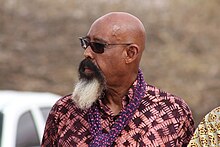Siad Hersi
Abdullahi Mohamed Siad Hersi , also General Morgan called, is a warlord ( warlord ) in the Somali civil war . He belongs to the clan of Majerteen- Darod .
Siad Hersi received military training in Italy and the USA . He became the son-in-law of the authoritarian President Siad Barre , who came from the Marehan Darod clan from southwest Somalia . Under this he was responsible for measures against the rebel movement SSDF of his own clan. As Barres Defense Minister he fought the SNM rebel uprising in Northern Somalia ( Somaliland ) in 1988 . He was said to be responsible for various crimes against the civilian population, earning him the nickname "butcher of Hargeisa " (butcher of Hargeisa) earned.
In 1991, various rebel movements succeeded in ousting the Barre government. At the time, Hersi was the most senior military officer in the break-up Somalia. Until 1993 he fought in the south of the country in vain to get Barre back. Here he founded the Somali National Front (SNF) from the Marehan clan and remaining units of the Somali army , which soon split. After the withdrawal of the US and UNOSOM troops, he gained control of the port city of Kismayo in 1995 , which he lost in 1999 to an SNSF faction allied with the warlord Mohammed Farah Aidid , but continued to besiege. Instead, Hersi formed the Somali Patriotic Movement- Harti (SPM) from his supporters, which formed various alliances against Aidid during the civil war (e.g. with Ali Mahdi Mohammed or with Abdullahi Yusuf Ahmed , the president of the de facto autonomous Puntland ) and against the Somali transitional government has closed.
Hersi fought the interim president Abdikassim Salat Hassan , who was in office from 2000 to 2004 and with whom he had once sat in government. Hassan was the last interior minister and deputy prime minister under Barre until 1991. Hassan's successor, Abdullahi Yusuf Ahmed, has not submitted to him either.
While Hersi commanded 56,000 soldiers in the Somali army in 1991 , the country is now under the control of 75,000 militiamen, of whom only around 1,000 follow the general.
Web links
swell
| personal data | |
|---|---|
| SURNAME | Hersi, Siad |
| ALTERNATIVE NAMES | Abdullahi Mohamed Siad Hersi, General Morgan |
| BRIEF DESCRIPTION | Somali warlord |
| DATE OF BIRTH | 20th century |
